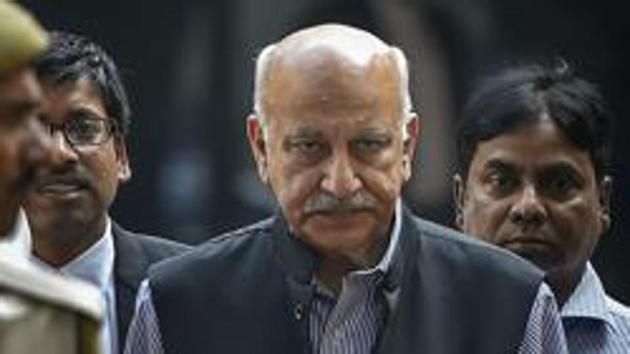Defamation case: Ramani seeks acquittal, says freedom of speech intrinsic to a democratic society
Former union minister MJ Akbar filed the case under Section 499 of the Indian Penal Code in November 2018 after Ramani made an allegation of sexual misconduct against him on Twitter in October 2018 during the Me Too movement.
Rebecca John, the lawyer for journalist Priya Ramani, concluded her arguments on Saturday in an online hearing of the criminal defamation suit filed against her client by former Union minister MJ Akbar.

Akbar filed the case under Section 499 of the Indian Penal Code in November 2018 after Ramani made an allegation of sexual misconduct against him on Twitter in October 2018 during the Me Too movement.
Ramani “exercised due care and attention” in her tweets which were “made in good faith” and “for public good” John said.
“Freedom of speech and expression as given under article 19 of the Constitution of India is critical and intrinsic to a democratic society. Priya Ramani has been able to show the truth and the public good of her statements made in the public domain. She was a small part of a large nationwide and global movement that uncovered the pervasive nature of sexual harassment at the workplace. The Me Too movement revealed the prevalence and normalisation of sexual harassment at the workplace with hundreds of thousands of women across the world participating in it,” John told the court of Additional Metropolitan Magistrate Vishal Pahuja.
Ramani’s allegation pertained to the time when Akbar purportedly interviewed her in 1993 for a reporter’s position while he was the editor of Asian Age newspaper. Akbar denied the allegation and said the meeting, as described by Ramani, did not take place.
Refuting the charge that Ramani’s tweets and an article which she wrote on sexual harassment at the workplace were “per se defamatory” and harmed the reputation of Akbar, John said that it was not defamation if what was imputed is the truth and was stated in good faith for the public good.
In February, Akbar’s lawyer Geeta Luthra had said during her closing arguments that Ramani’s statements against Akbar were “per se defamatory” and were made with the intention to harm the reputation of her client.
Citing other cases, Luthra had said, “It is sufficient to show that the accused has reason to believe that [what they said] will harm the reputation of the person.”
“I have examined people who said that they held [Akbar] in high regard, and the respect they held for him was lowered in our eyes… In this case, no reasonable person can say that it was not defamatory,” Luthra said.
John pointed out that Akbar’s lawyers had opened the door to the issue of Akbar’s reputation, which put the onus upon her to contest their claim. “There was an avalanche of disclosures against the complainant. [Ramani’s] was one of them,” John said.
Fourteen women made allegations of sexual harassment and inappropriate behaviour at the workplace. One of them, journalist Ghazala Wahab, was Ramani’s witness.
Akbar, who was the minister of state for external affairs at the time the allegation was made, resigned shortly after they surfaced. “There are some people who, when their reputation is hurt, it shatters their whole existence. It destroys them,” Luthra said during her closing arguments.
“My case has always been that before I met him I admired him as a journalist and as a writer. But his conduct with me on that night in December 1993, and the experiences of other women, does not justify this complaint,” John said on behalf of her client, on Saturday.
John quoted deceased United States Supreme Court judge Ruth Bader Ginsberg, who in a 2015 interview spoke of the “arbitrary barriers put in women’s way”, which is “the experience of everyone who grows up female”.
“The Me Too movement and the challenge to sexual harassment at the workplace was an attempt to correct the historical wrong, and an attempt to remove the arbitrary barriers that have been put in women’s way,” John said.
Luthra will respond to John’s final arguments on October 13 and 15.
Get Current Updates on India News, Lok Sabha Election 2024 live, Infosys Q4 Results Live, Elections 2024, Election 2024 Date along with Latest News and Top Headlines from India and around the world.



